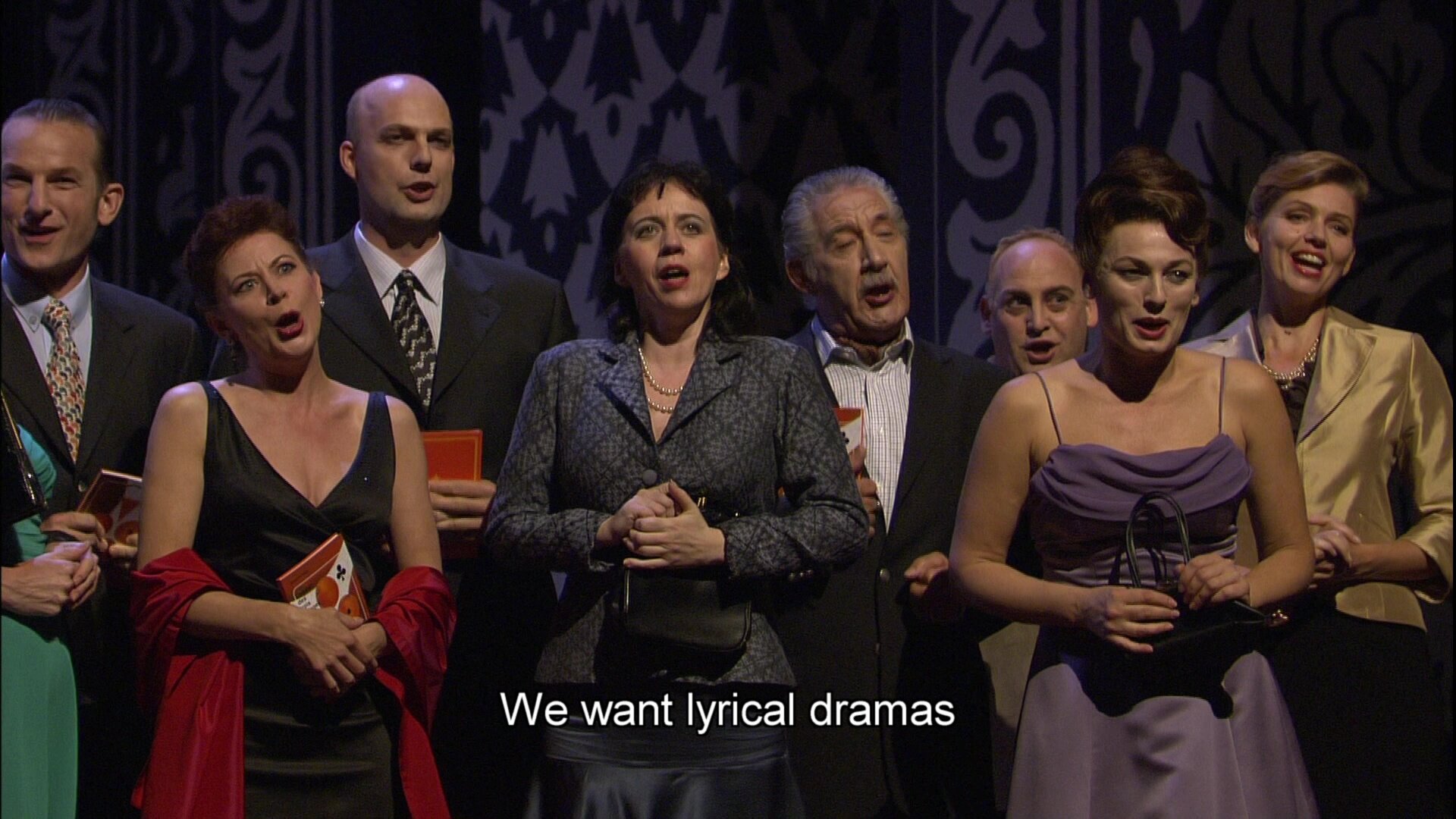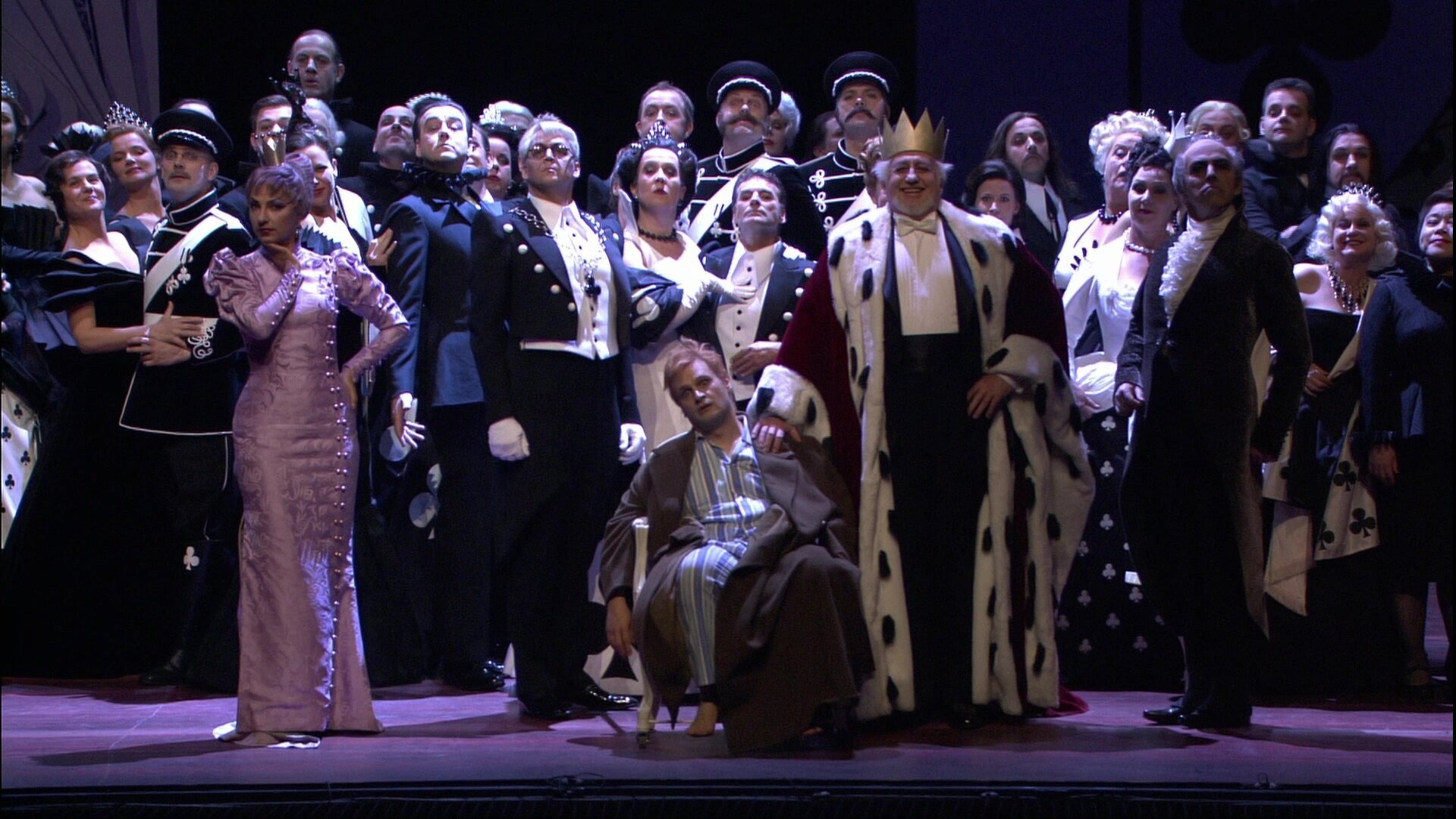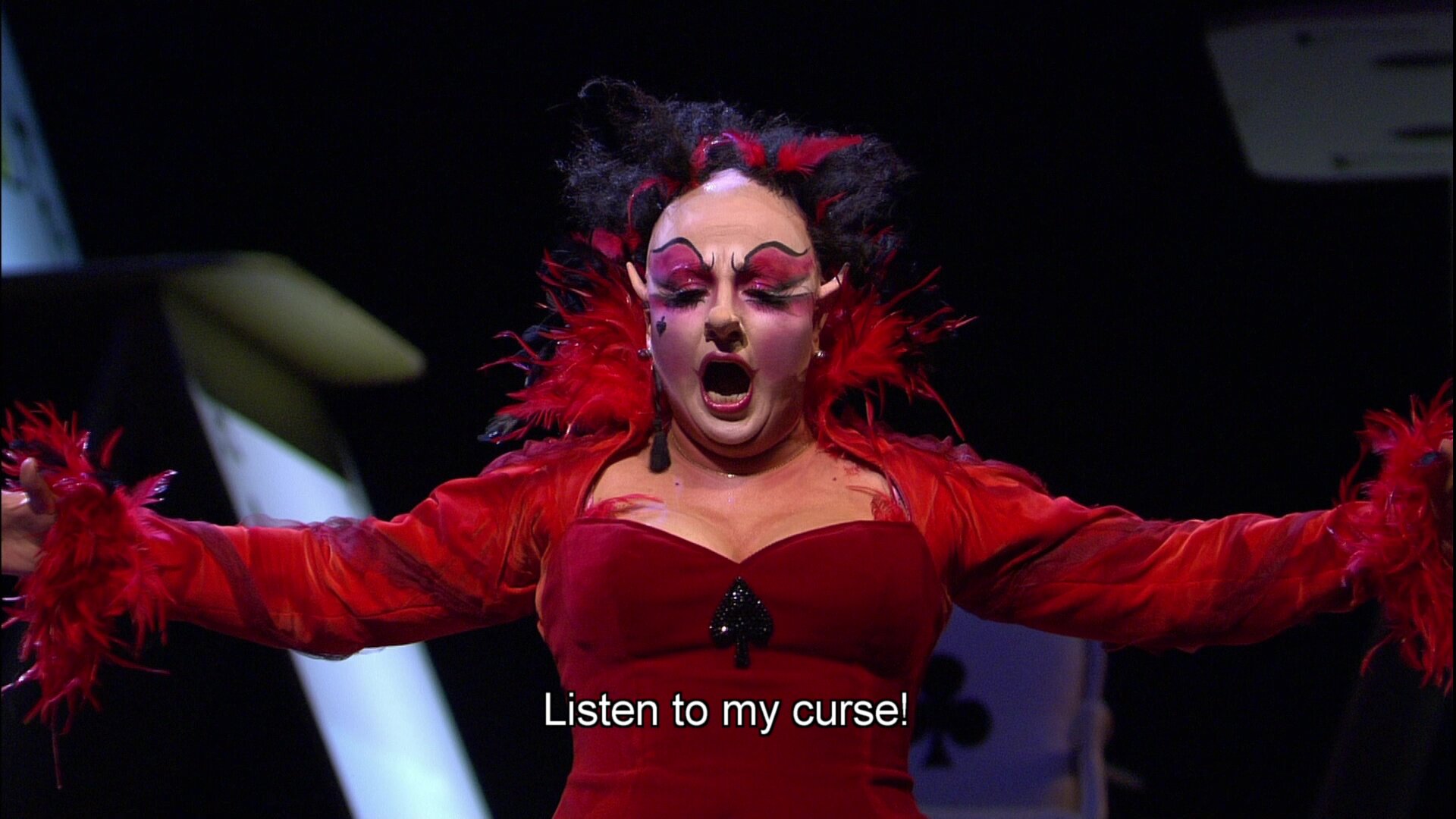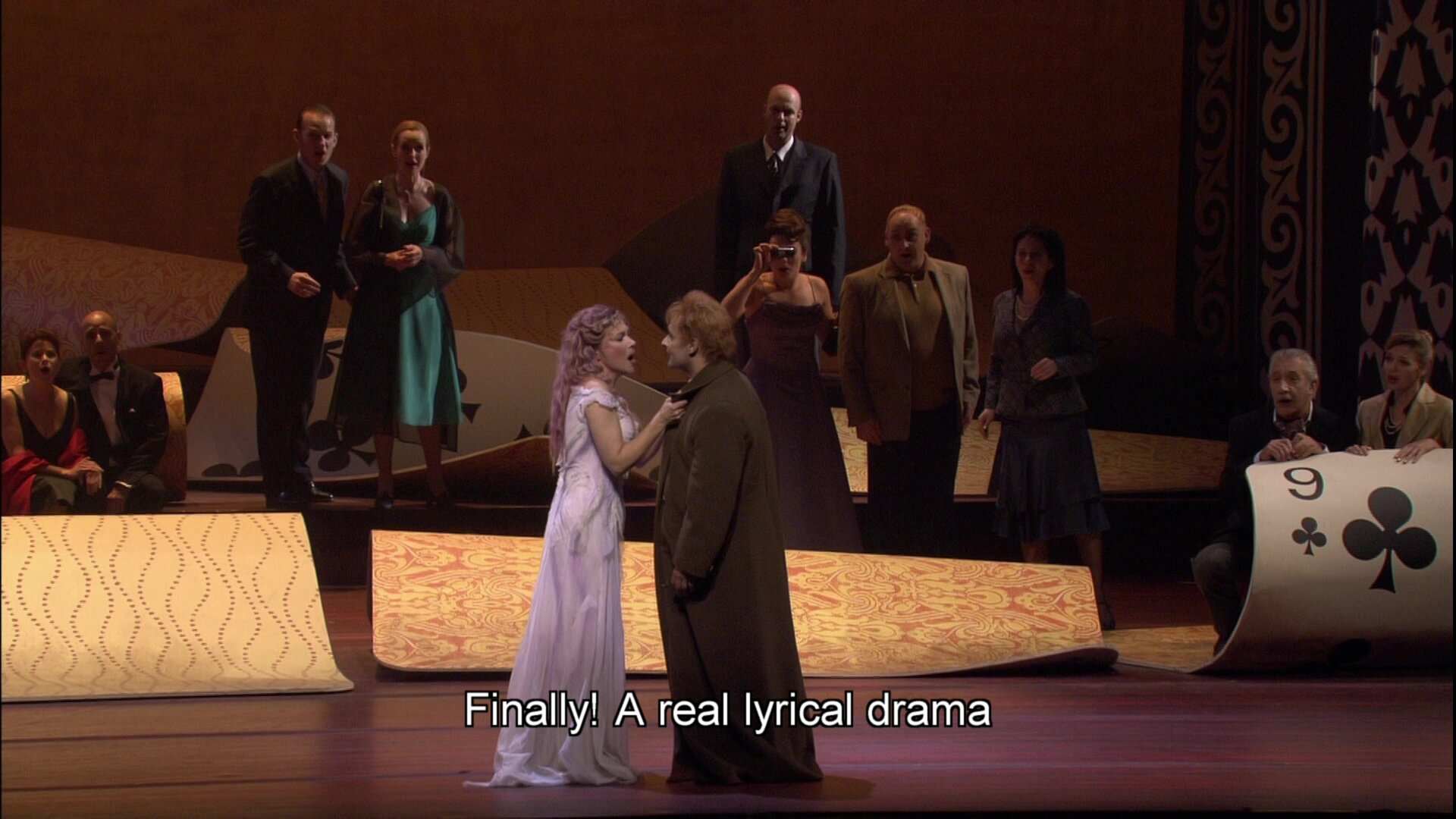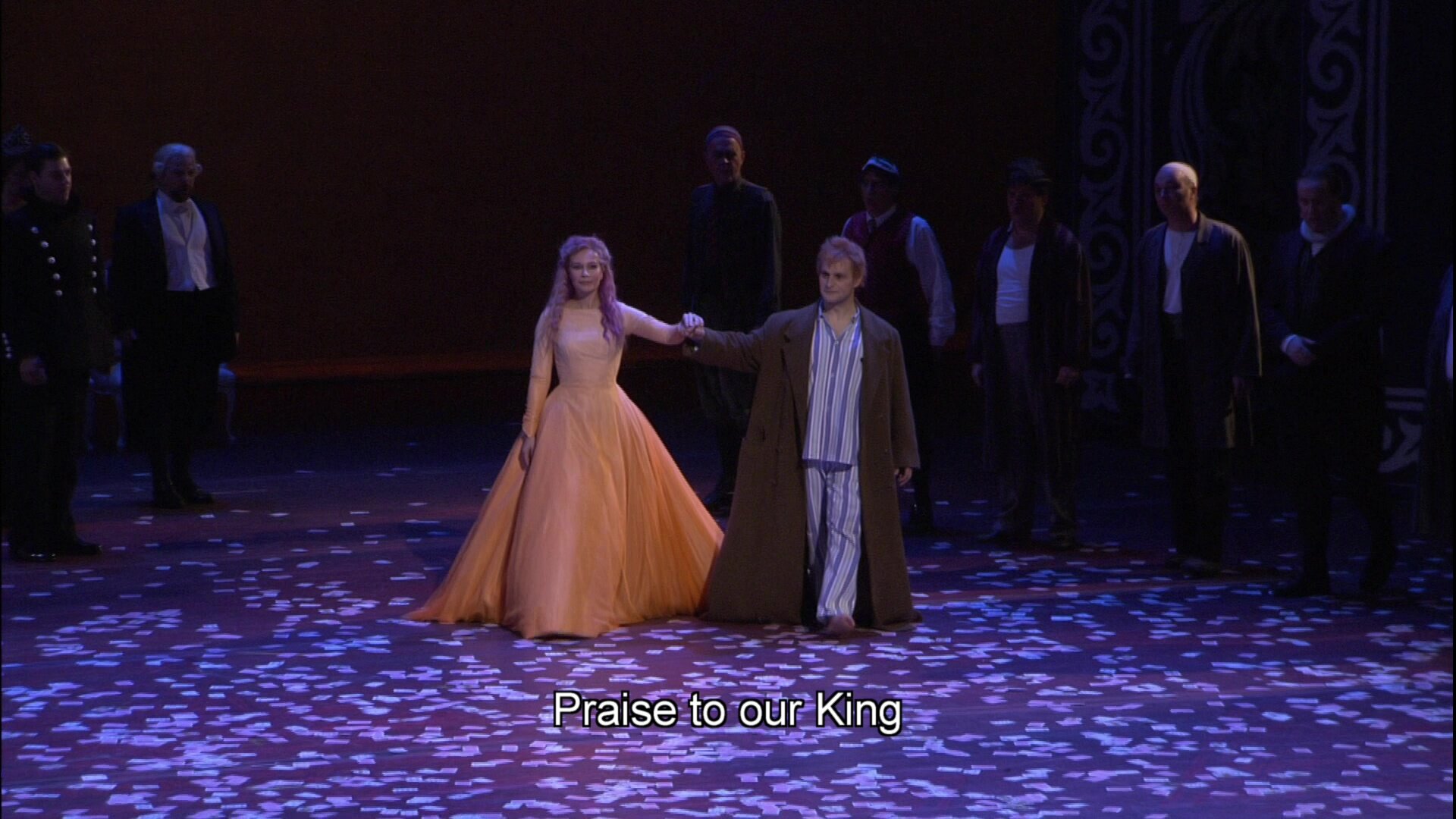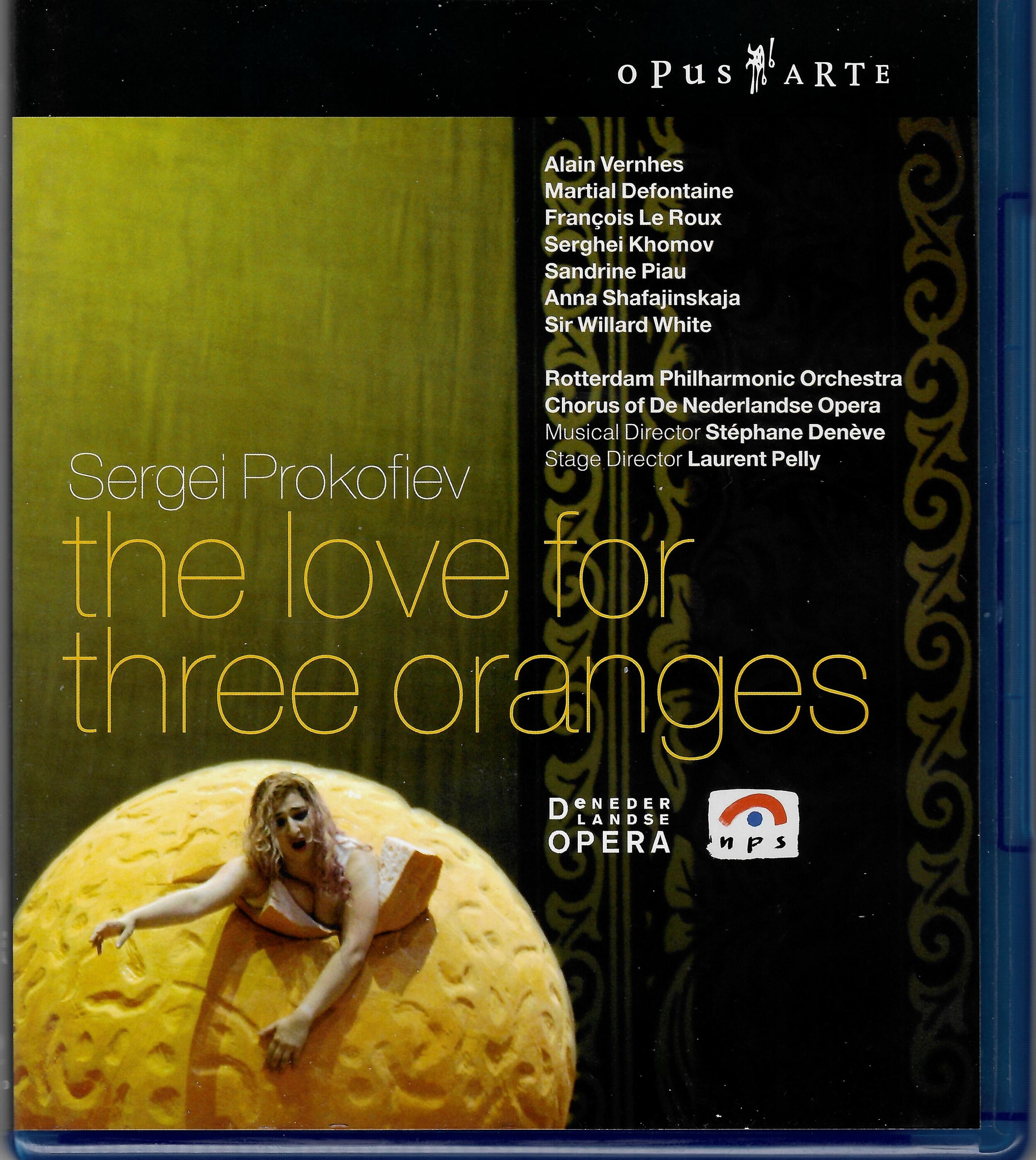
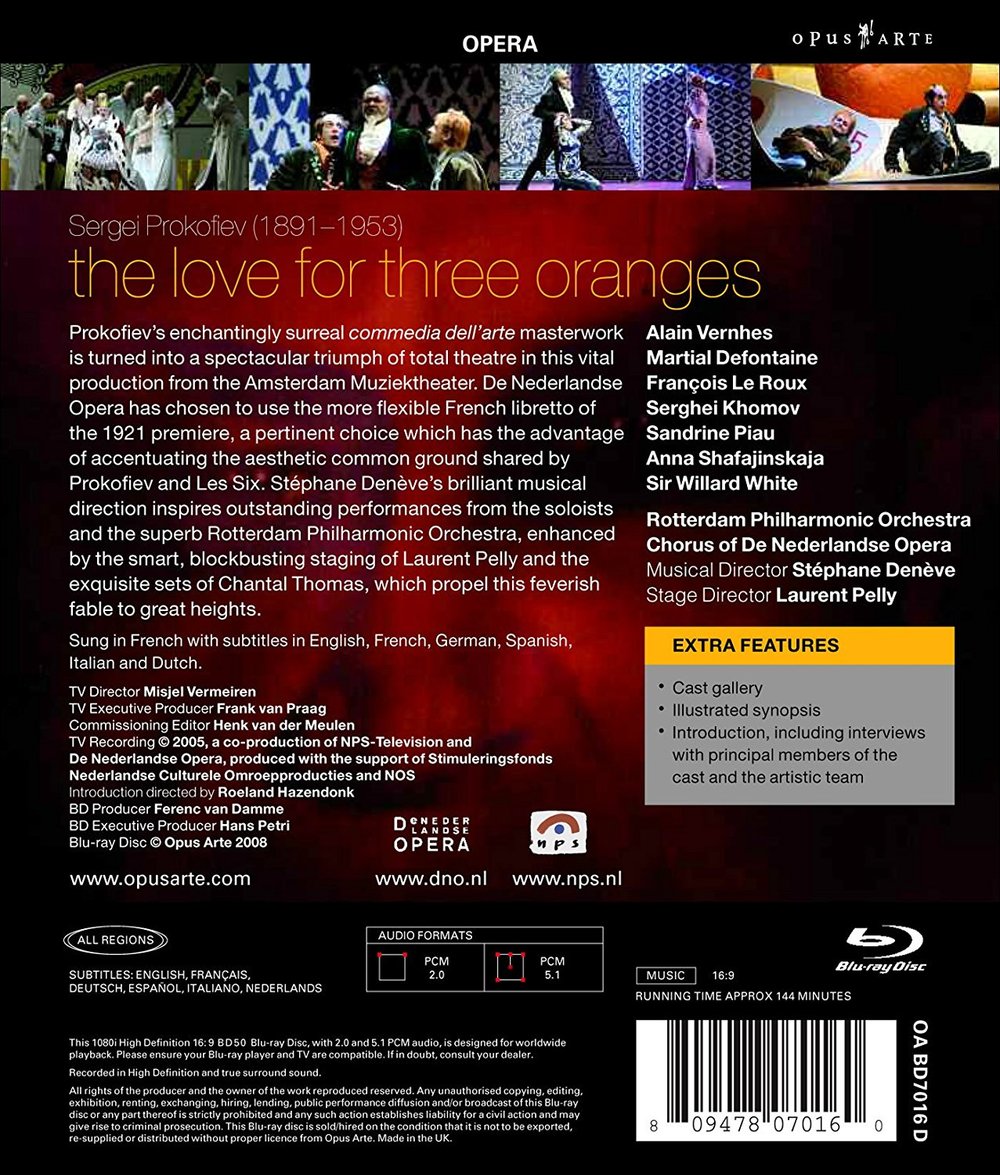
Prokofiev The Love for Three Oranges opera to a libretto written by the composer based on a play by Carlo Gozzi. Directed 2005 by Laurent Pelly at De Nederlandse Opera (Muziektheater). Stars Alain Vernhes (King of Clubs), Martial Defontaine (The Prince), Natascha Petrinsky (King's Niece), François Le Roux (Léandre, the Prime Minister), Serghei Khomov (Trouffaldino), Marcel Boone (Pantalon), Sir Willard White (Tchélio, sorcerer, the King's protector), Anna Shafajinskaja (Fata Morgana, Léandre's protector), Sylvia Kevorkian (Linette, a princess), Magali de Prelle (Nicolette, a princess), Sandrine Piau (Ninette, a princess), Richard Angas (La Cuisinière, the gigantic cook), Alexander Vassiliev (Farfarello, a demon/herald), Marianna Kulikova (Sméraldine, a slave), Sergei Khomov (Master of Ceremonies), as well as Ruud Kok, Robert Kops, Willem Korteling, Jan Majoor, Wojtek Okraska, Jan Polak, Harry Teeuwen, Martin Vijgenboom, Bert Visser, and Arjan Wiering (10 Eccentrics). Stéphane Denève conducts the Rotterdam Philharmonic Orchestra and the Chorus of De Nederlandse Opera (Chorus Master Martin Wright). Sets by Chantal Thomas; costumes by Laurent Pelly; lighting by Joël Adam; choreography by Laura Scozzi. Directed for TV by Misjel Vermeiren. Sung in French. Released 2008, disc has PCM 5.1 sound. Grade: A+
When I was a kid, we didn't have HDVD. We didn't have TV. We had radio and 8mm black and white home movies. Kids loved the serials on radio. I waited all week for "The FBI in Peace and War." I wasn't interested in the propaganda—I loved the theme song, a jaunty march that sent me careening about the kitchen. I asked my mom, "Where did the music come from?" She said, "From a modern opera about oranges. It was too crazy to perform, but people like that song."
Mom correctly thought back then that The Love for Three Oranges was modern. But the way I see it now, the 4 Ages of Opera are (1) Early Opera, (2) Age of Aria, (3) Age of Orchestration, and (4) Modern Opera or the Age of Experimentation. The Age of Aria ended and the Age of Orchestration began in 1926 when Puccini died working on Turandot. Modern Opera began in 1976 with Einstein on the Beach. Oranges was first performed in 1921, so it now belongs to the very end of the Age of Aria. But it is crazy, because it's a satire of all opera up to 1921. In Oranges, the Age of Aria pulls the top down on its own coffin. The more you know about opera, the quicker you will thoroughly enjoy Oranges. Still, for the novice there's plenty of fast action and broad strokes such as beautiful princesses finally released from captivity only to immediately die horrible deaths.
The traditional goal of all theater is to create in the audience a suspension of disbelief. Because Oranges is satire, there will be frequent interruptions to jar the audience into remembering where they really are. Even before the show starts, groups of protesters (called “eccentrics” or “cranks”) assault the stage demanding a tragedy, a comedy, or lyric drama. All will be frustrated because they are going to get a fairy tale with avant-garde music:
Soon we are in the Kingdom of Clubs. In case you have forgotten, clubs is the lowest of the four suits in the deck of cards. Below we see a royal ceremony to the tune of Prokofiev famous march:
See the Royal family portrait below. Grinning inanely is the King of Clubs (Alain Vernhes). Front right in the ruffled shirt is the Prime Minister Léandre (François Le Roux) who is plotting to replace the King. The woman standing left front in the lilac dress is Princess Clarice (Natascha Petrinsky) the King’s niece. Clarice has promised to marry Léandre when he gets rid of the King. Standing front left in white gloves is Pantalon (Marcel Boone), The King’s confidant. The main obstacle to the plans of Léandre and Clarice is the Prince (Martial Defontaine), seated center, who is next in line for the throne. The Prince doesn’t appear, however, to be particularly formidable:
Many doctors (decked out in deliberately blotched wigs) attend the unprincely Prince. He suffers many illnesses, but especially melancholia:
The King and Pantalon bring in the jester Trouffaldino (Serghei Khomov) to cheer up the Prince by making him laugh:
Clarice and Léandre are joined in their conspiracy by the slave girl Sméraldine (Marianna Kulikova). Sméraldine’s costume is camouflage in the Kingdom of Cards. She is the ultimate social climber, always snooping around the palace learning stuff she can use to leverage her assent. Here she warns the other villains that the King and Prince are protected by a supernatural power, the sorcerer Tchélio!
(Tchélio in English subtitles = Chelio.) Below behold Chelio (Sir Willard White):
Chelio is an obstacle. But Clarice and Léandre have their own protector in the person of Fata Morgana (Anna Shafajinskaja) with her venomous lizard:
Now Trouffaldino is working (as hard as his limited attention span allows) on the ambitious plan to get the Prince to laugh. The first step is to coax the Prince out of his bedroom:
The Prince gets to the party, but he’s not in the mood:
Even the professional fool is dispirited by the hopelessness of getting a chuckle out of the Prince. But Fata Morgana arrives in an ill-advised move to support Léandre and Clarice. In an accident she falls. The prince glimpses up her skirt, and then breaks out into convulsions of laughter!
Fata Morgana, furious, takes her revenge in a curse scene that even Verdi himself would envy. The Prince will henceforth be in love with three oranges and be consumed by an unstoppable drive to find them:
The oranges in question are in the pantry of the witch Creonta, whose kitchen is occupied by a giant cook armed with a lethal ladle:
But now the Prince is suddenly inspired to action! He and Trouffaldino outwit the cook and find three plump oranges! They easily escape with the treasure in hand. But as they cross the desert surrounding them, the oranges keep growing and growing and it gets harder and harder to move them along. Mad with thirst, Trouffaldino opens two oranges looking for water. An enslaved princess pops out of each. But when there is no water for them either, they die!
You will have to watch the disc to find out how the Prince, now rapidly showing enhanced practical and social skills, manages to rescue the last princess in the third orange:
And as true love develops before our very eyes, the Lyricals infiltrate the stage in approval. The Comicals and Tragicals are still in hiding and hoping for better things:
The Prince and his new love make it back to the Castle of Clubs. The truth about the perfidy of Léandre, Clarice, and Sméraldine comes out. Tragicals on the left of the stage are delirious about the triple execution coming up
But Trouffaldino found some popcorn backstage and is looking for an empty seat on the front row. You wouldn’t want to spoil his snack with some hangings, would you?
So the Lyricals win out with a nice wedding scene—the bride is dressed in Orange and the Prince in pajamas:
These meager screenshots can only hint at all the twists, turns, and surprises built into this riotous fairy tale. No better crew for this trip down the rapids than De Nederlandse Opera. The production, video take, and sound recording for this disc were praised by everyone even in DVD and even more in HDVD. It’s now 2020, and this video is 15 years old. But the PQ is still great. Thanks to its unique designs and bracing music, the production doesn’t seem dated at all. So if you are an Oranges fan, you have to have this in HDVD. If you are an opera beginner, get this disc and watch it cold. Then watch it every now and then as your knowledge of opera grows—each time you will probably like Oranges more.
It’s been a long time since I tore through Mom’s kitchen to the “March from Three Oranges.” Thanks Mom for not hitting me with your ladle. My chances of seeing Oranges live have been nil. In the last 15 years, it has been produced only one time in the United States (Operabase). And subject title is the only Blu-ray of Oranges. The quality is high and this is almost a rarity. A+
OR
